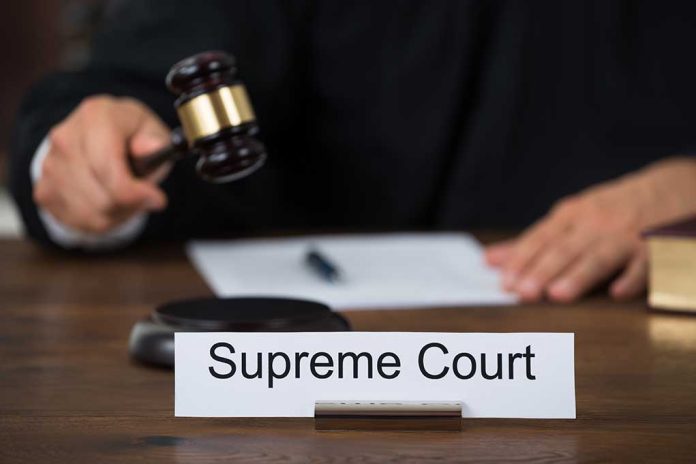
Louisiana prison guards forcibly shaved a Rastafarian inmate’s dreadlocks despite a court order protecting his religious rights, and now the Supreme Court will decide if he can sue them for damages in a landmark religious freedom case.
Key Takeaways
- The Supreme Court will hear the case of Damon Landor, whose dreadlocks were forcibly cut in violation of his Rastafarian beliefs despite having a court order protecting his religious expression.
- The case centers on whether the Religious Land Use and Institutionalized Persons Act (RLUIPA) allows inmates to sue prison officials for monetary damages when their religious rights are violated.
- The Trump administration is supporting Landor’s appeal, arguing that the lack of damages undermines religious freedom protections for the incarcerated.
- The Louisiana Department of Corrections argues that allowing personal liability would worsen prison staffing shortages.
- A decision is expected by summer 2026 and could impact religious rights for over one million incarcerated individuals nationwide.
Religious Rights Violated Despite Court Protection
Damon Landor, a former inmate at Louisiana’s Raymond Laborde Correctional Center, had taken a Nazarite Vow to let his hair grow as part of his Rastafarian faith. The incident occurred during the final three weeks of Landor’s five-month sentence, when prison guards forcibly shaved his dreadlocks despite Landor carrying a court ruling that explicitly protected his religious rights. According to court documents, a prison guard discarded this court order before proceeding with the forced haircut, demonstrating a blatant disregard for both judicial authority and religious liberty.
The Rastafari faith, which originated in the 1930s in Jamaica, combines Old Testament teachings with a desire to return to Africa and was popularized globally by musicians like Bob Marley and Peter Tosh. For practitioners like Landor, growing dreadlocks is not merely a style choice but a sacred religious obligation. While prison systems have legitimate security concerns regarding grooming standards, this case raises serious questions about whether those concerns truly justified overriding a court-protected religious practice, especially for an inmate nearing release.
Legal Battle Over Religious Protections
The core legal question revolves around the Religious Land Use and Institutionalized Persons Act of 2000 (RLUIPA), which protects religious rights in land regulations and prisons. This federal law prohibits substantial burdens on religious exercise unless it serves a compelling governmental interest and is the least restrictive means of achieving that interest. However, lower courts have consistently ruled that RLUIPA does not allow inmates to sue officials for monetary damages when their rights are violated, effectively limiting the law’s enforcement mechanism.
“The denial of a damages remedy to vindicate RLUIPA’s substantive protections would undermine that important purpose. And the circumstances precluding relief here are not unique,” argued Solicitor General D. John Sauer.
Even though the 5th U.S. Circuit Court of Appeals acknowledged Landor’s mistreatment, it maintained that current law doesn’t permit monetary damages against prison officials. This legal gap has created a situation where prison authorities can violate religious rights with little consequence, especially for inmates like Landor who are near release and won’t benefit from injunctive relief. Landor’s attorneys have pointed to a 2021 Supreme Court decision that allowed Muslim men to sue over the FBI’s no-fly list as a precedent for their case.
National Implications for Prisoner Rights
This case carries significant implications for religious freedom within America’s prison system. The Supreme Court’s decision will affect over one million people currently incarcerated in state prisons and local jails across the country. Four justices have already voted to hear Landor’s appeal, with oral arguments scheduled for the next term beginning in October and a decision expected by summer 2026. The outcome could fundamentally reshape how religious accommodations are handled in correctional facilities nationwide.
More than one million people are incarcerated in state prisons and local jails. Under the prevailing rule in the circuit courts, those individuals are deprived of a key remedy crucial to obtaining meaningful relief,” stated Landor’s attorneys at Weil, Gotshal & Manges and Casey Denson Law.
Louisiana officials oppose the Supreme Court’s intervention, claiming there’s no circuit court split on the issue and warning about potential consequences for prison operations. “Serious consequences would flow from Petitioner’s view, if adopted. For example, the current staffing shortage in state prisons would only grow worse if current staff and potential job applicants learned that they would be personally liable for money damages,” argued the state in court filings. The state has also noted that it has since amended its prison grooming policy to prevent similar incidents.
Trump Administration Supports Religious Liberty
President Trump’s administration has taken a strong stance in support of Landor’s appeal, recognizing the importance of protecting religious liberty even within prison walls. This position aligns with the administration’s broader commitment to defending religious freedom across various contexts. The case, officially titled Landor v. Louisiana Department of Corrections, 23-1197, represents a critical test of whether constitutional and statutory religious protections extend meaningfully to the incarcerated or exist merely as theoretical rights without practical enforcement mechanisms.
“Without a damages remedy, RLUIPA’s promise was empty. The panel could respond only by writing in italics that it ’emphatically condemned [ed]’ Landor’s mistreatment, as it dismissed his claims and left Landor with no relief whatsoever. That is a telltale sign that this Court’s intervention is needed,” argued Landor’s lawyers in their appeal.
The Supreme Court’s eventual ruling will establish whether prison officials can be held personally accountable for religious liberty violations or if inmates must accept condemnation without compensation as their only remedy. For conservatives who value both religious freedom and governmental accountability, this case presents a fascinating intersection of principles that cuts across traditional political divides, highlighting how fundamental rights should be protected regardless of an individual’s circumstances.






